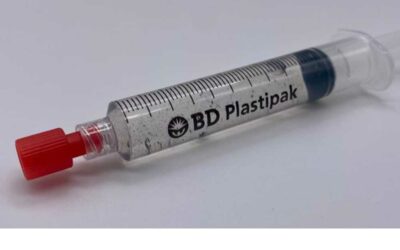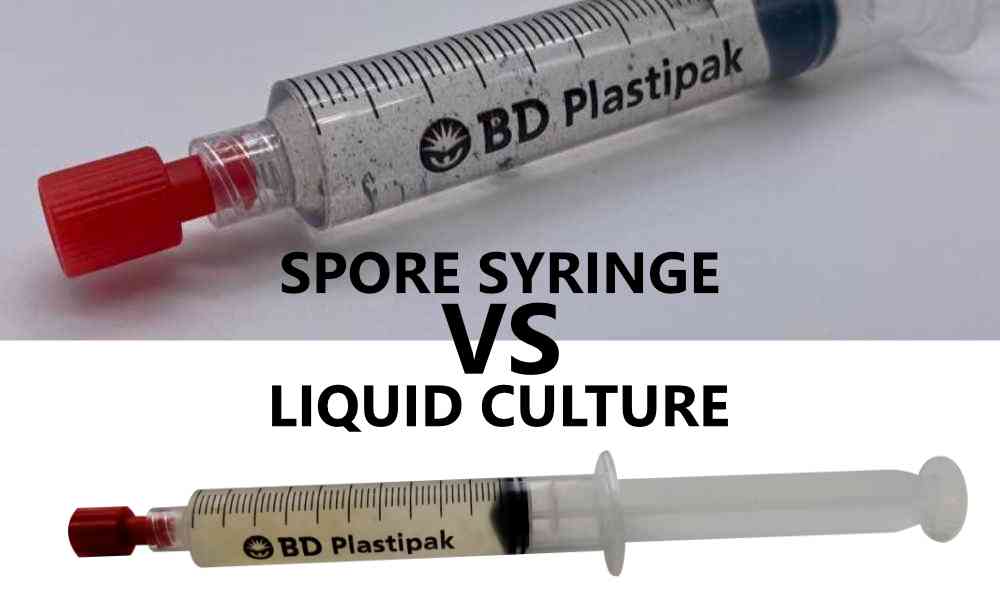What Is A Spore Syringe?
A spore syringe contains sterile water infused with mushroom spores. These spores are the reproductive units of fungi, capable of germinating and forming mycelium under the right conditions.
Key Features of Spore Syringes:
Composition: Sterile water with visible spore sediment.
Appearance: Spores often appear as tiny black, purple, or brown clumps suspended in the solution.
Use Case: Spore syringes are ideal for microscopic research, beginners experimenting with fungal growth, and creating genetic diversity.
Pros of Spore Syringes:
- Long shelf life when stored properly.
- Widely available and easy to use.
- Affordable and beginner-friendly.
Cons of Spore Syringes:
- Spores need time to germinate before forming mycelium, leading to slower results compared to liquid cultures.
- A higher chance of contamination during germination if sterile techniques aren’t followed.

What Is A Liquid Culture?
A liquid culture contains living mycelium suspended in a nutrient-rich liquid, typically a mixture of water and sugars like honey or malt extract. Unlike spore syringes, liquid cultures skip the germination phase, as the mycelium is already actively growing.
Key Features of Liquid Culture:
Composition: Nutrient solution with actively growing mycelium.
Appearance: Liquid cultures often appear slightly cloudy, with visible strands of mycelium floating inside.
Use Case: Ideal for advanced mycology enthusiasts who want faster colonization and more consistent results.
Pros of Liquid Cultures:
- Faster colonization due to pre-grown mycelium.
- Less risk of contamination during the initial growth phase.
- Can be expanded into more cultures, making it cost-effective for large-scale projects.
Cons of Liquid Cultures:
- Shorter shelf life compared to spore syringes.
- Requires careful handling to avoid contamination.

Key Differences Between Spore Syringes and Liquid Cultures
| Spore Syringe | Liquid Culture | |
| Contents | Sterile water with spores | Nutrient solution with living mycelium |
| Ease of Use | Beginner-friendly, simple to use | Requires more care to handle and store |
| Speed | Slower (spores must germinate first) | Faster (mycelium is already established) |
| Shelf Life | Up to 1-2 years with proper storage | Typically 2-6 months when refrigerated |
| Cost | Affordable | Slightly more expensive than spore syringes |
How Long Do Spore Syringes Last?
When stored correctly, spore syringes have an impressive shelf life of up to 1-2 years, sometimes longer. Proper storage involves keeping them in a cool, dark environment, such as a refrigerator, to maintain spore viability.
Tips for Prolonging the Life of Your Spore Syringe:
- Store them between 2°C and 8°C (36°F to 46°F).
- Keep them in a sealed, sterile bag to prevent contamination.
- Avoid exposing them to light or extreme temperatures, as this can damage the spores.
Which Should You Choose?
The decision between a spore syringe and a liquid culture depends on your needs and experience level.
Choose a Spore Syringe If:
- You’re a beginner exploring the world of mycology.
- You want to study the spores microscopically.
- You’re looking for a more affordable option with a longer shelf life.
Choose a Liquid Culture If:
- You need faster results and consistent growth.
- You’re experienced and comfortable with sterile techniques.
- You’re working on larger-scale projects requiring rapid colonization.
Final Thoughts
Both spore syringes and liquid cultures play a vital role in mycology. Understanding their differences will help you make an informed choice for your specific needs. Spore syringes offer versatility and longevity, while liquid cultures provide speed and efficiency.
Looking to get started? Browse our high-quality spore syringes and learn more about how to store spore syringes. Want to explore more advanced options? Check out our resources on spore prints.
Your content goes here. Edit or remove this text inline or in the module Content settings. You can also style every aspect of this content in the module Design settings and even apply custom CSS to this text in the module Advanced settings.
Your content goes here. Edit or remove this text inline or in the module Content settings. You can also style every aspect of this content in the module Design settings and even apply custom CSS to this text in the module Advanced settings.
